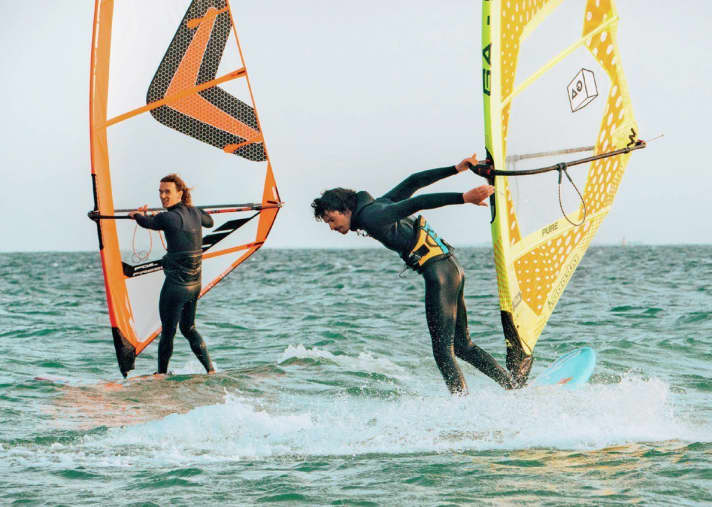"We were playing table football with a few guys last night and thought about whether we should really head over to the freestyle competition at the German Windsurfing Cup tomorrow. We realised it was going to be super stressful and thought: hey, we don't need that, we'll just do our own contest," Adi Beholz chats casually into the microphone during the surf festival in 2010. And bang: the German Freestyle Battles are born!
All the top German riders were there, the atmosphere was relaxed, the principle was simple: riders judged riders, and the conditions behind the pier, at the favourite spot around the corner in Großenbrode, were first class. Adi Beholz is thrilled: "This is a real German freestyle championship, with super cool conditions."
Stand-by and minimum effort offer the best conditions
And that's exactly what the German Freestyle Battles are all about - that hasn't changed to this day. The standby format and minimal set-up make it possible to hold the contest at the right time and in the right place - and not on a fixed date, for example in the Sylt shorebreak with a wind force of just four. The standard on the water therefore shot through the roof. It's not about who can cope best with the prevailing conditions (as they say at most competitions in semi-optimal conditions), but rather the latest move combinations that are so complex that they are largely impossible for outsiders to judge. The concept of "riders judging riders" has proven itself over the years - the freestylers only needed themselves, a good spot and plenty of wind, everything else was secondary. Chapeau! Long live freestyle!
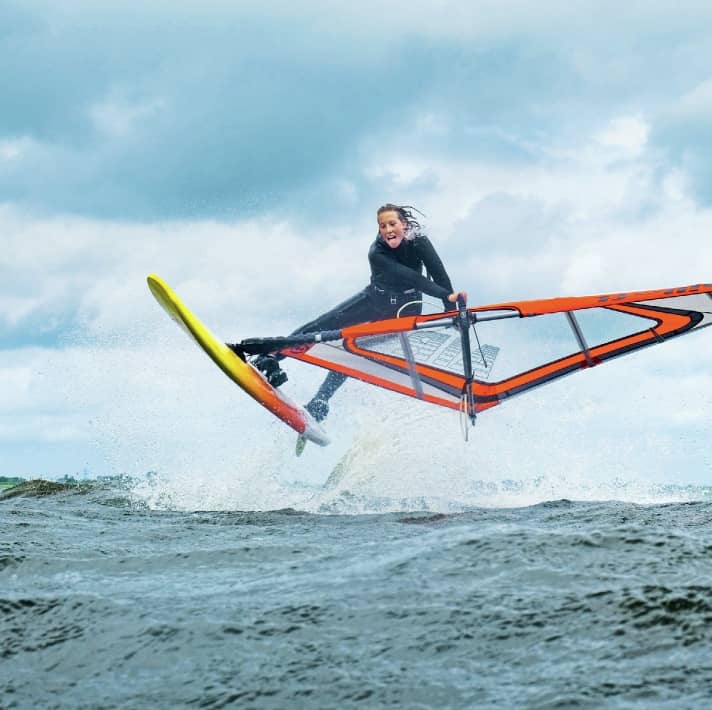
When Adi Beholz slowly handed over the organisation of the Freestyle Battles - in cooperation with the Boddenstylers after a few simple but successful years of punk rock - to the next generation around Valentin Böckler, things got particularly interesting. Organising talent Böckler put his heart and soul into the project and quickly pushed the German freestyle scene with its new format to a level that quickly gained an international reputation: three to four freestyle battles a year, record numbers of participants, riders sometimes travelling from all over Germany for a windy battle weekend, plus professional photographers and event videos that made the rounds in international online magazines.
Valentin looked after the German freestyle scene and its talents like his own baby. He did everything he could to help young German riders make it big. And that included being allowed to keep an official German ranking list for the freestyle discipline, which he successfully campaigned for with the GWA and Choppy Water GmbH.
Sponsors quickly jumped on the bandwagon of media attention - but the Boddenstylers jumped off just as quickly. These formal developments did not suit the carefree freestyle team from Mecklenburg-Vorpommern.
Sponsors and rankings were viewed with scepticism at the GFB
Cups, non-cash prizes and even prize money were no longer the exception. A good placing at the German Freestyle Battle was suddenly worth more than a cold beer and a handshake from colleagues. The scene and the media were aware of this, and so were sponsors. Despite everything, the German Freestyle Battles never really sold their soul: "Even with an official ranking list and a few co-operations with other events and sponsors, we actually always did what we wanted," recalls Valentin, "I did feel the need to make everything a bit more official and therefore had to immerse myself in the official structures of the GWA and the German Sailing Association. But we still remained a loose collective of windsurfers who simply wanted to spend a fun day on the water together."
Judging was done from a beer bench, sometimes without a roof over your head, but always in the best spot - that was the top priority, everything else was adapted. Pedestals made from deposit boxes, broken masts as flag holders, old buses all around and rocked-out freestyle equipment. Ninety per cent of the sails are 4.4 square metres: no matter what the wind strength. Outsiders on site must have thought to themselves: "What are they doing there?" Very few people thought that this was the hottest German freestyle championship in windsurfing.
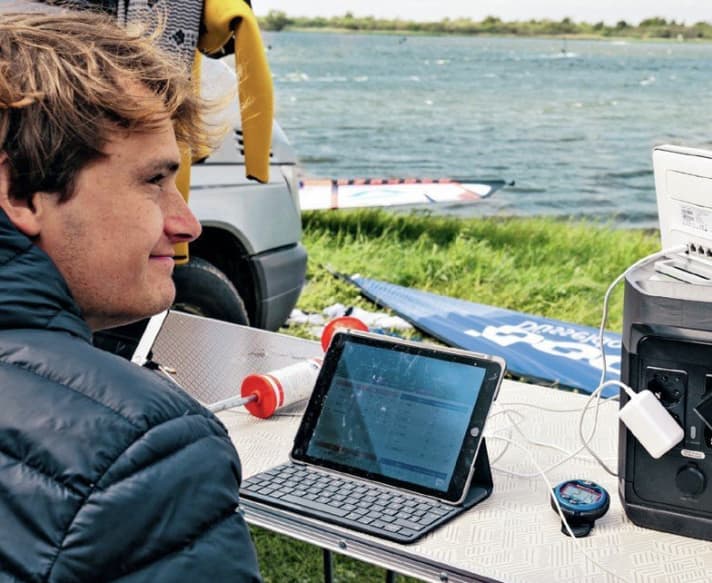
But whoever won the freestyle battle was the best - no excuses. And even if some ambitious freestylers were competing fiercely at the time, it was always clean and fair. At times, one or two riders had a little more at stake, but for ninety per cent of the participants, the German Freestyle Battles are one hundred per cent about having fun and enjoying an exciting day on the water with friends. And at the end of the day, everyone has a toast with everyone else, that has never changed - official rankings or not.
Freestyle in Germany is being pushed by the GFB
How to put it? Valentin has turned raw punk rock back into reasonably polished rock 'n' roll - from which many people in the scene, as well as the discipline of freestyle in Germany in general, have benefited greatly, even if it has also put off a few isolated individuals.
Raw punk rock became reasonably polished rock 'n' roll." - Julian Wiemar
I walk through the beach camp of this year's surf festival and look for the GFB-Wagenburg, where the skippers' meeting is scheduled for noon. It's a glorious, sunny day on Fehmarn. The sun is at its zenith. It's already just after one o'clock, but it doesn't matter: times are always kept very tight at the freestyle battles - you can't really be that late. Even if someone doesn't have their wetsuit on before the heat, for example, the clock is stopped briefly. Some new participants have to get used to the fact that things can sometimes be a bit slow.
The German Freestyle Battles are extremely relaxed
In the past, well-structured professionals were sometimes even annoyed by the laissez-faire organisation - but everything always works out in the end, and then the atmosphere is usually good again. Outsiders only see the professional videos, bold images and the high level on the water and think it's like a World Cup event. They are then shocked at how relaxed the GFBs are overall despite everything.
I hear ice cubes clinking in large Aperol glasses, laughter, soft music in the background - this must be the place. And there it is: the unmistakable, rusty VW T-3 belonging to co-organiser Loris. The bright blue freestyle board, just over two metres long, is stretched across the roof. In front of it is a board with the heat sequence scribbled on it. This is where the music plays! Some are obviously still a little groggy from last night's opening night of the festival and are lying around lazily on blankets in the sun or in their open-top buses. Others are already upright again and drinking coffee, and one or two are already enjoying an Aperol Spritz. In any case, I'm not too late. The inner courtyard of the Wagenburg is slowly filling up. 58 people are registered this time - another record number of participants.
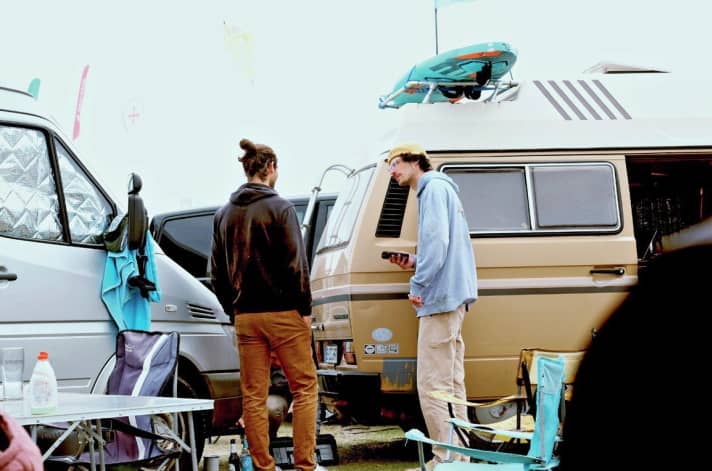
The cooperation with the DWC backfired
"I remember how tedious it was for a while back then," Valentin groans, "we needed at least twenty riders with club membership to be allowed to keep the official ranking list in Germany: We got down to fifteen. The other stubborn ones simply couldn't be persuaded to pay the thirty euros for the complete package offered to us by the GWA - somehow it worked out anyway," he says with a laugh.
"The ranking list worked perfectly for the next few years, but the cooperation with the DWC at the Multivan Windsurf Cup on Sylt in 2017 was a shot in the arm. Only a handful of freestylers made the (expensive) journey to Sylt, the rest of the starters were wave or slalom riders who had to remain on standby in Westerland throughout. This meant that we couldn't move the freestyle contest to the flat water at the elbows as planned - and ended up where we never wanted to be: in the Sylt shore break with a wind force of just four! That was a once-in-a-lifetime experience, and straight after that we raced the next contest again in perfect freestyle conditions on the island of Rügen in Suhrendorf," Valentin recalls the turbulent times.
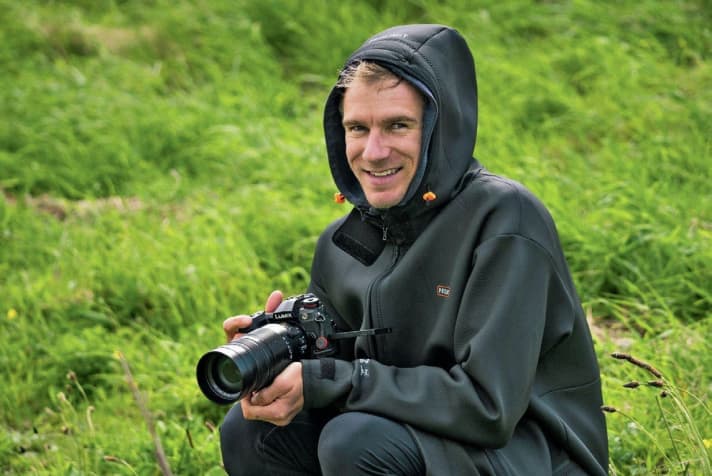
Leon and Loris are the new faces of the German Freestyle Battles
In the meantime, also due to the corona break, everything has calmed down and stabilised again. Valentin's self-employment in the film industry and his new passion for triathlon took over and he slowly handed over the main organisation of the GFBs to Loris Vietoris and Leon Struppeck (also known as Shorty). A deeply relaxed duo, two best friends from Kiel, who live for the discipline of freestyle and the lifestyle surrounding it and are currently keeping the freestyle battles alive. Nobody epitomises freestyle in Germany better than these two charismatic twenty-somethings. Loris regularly celebrates old-school manoeuvres such as cheese rolls or two-metre-high lazy suzans in the chop of the Seelenter See, while Shorty pushes himself to the latest power move combinations in the Wadden Sea near Büsum. Two unconventional individualists for whom the party location in the evening tends to overlap - rather than the manoeuvres they are currently honing.
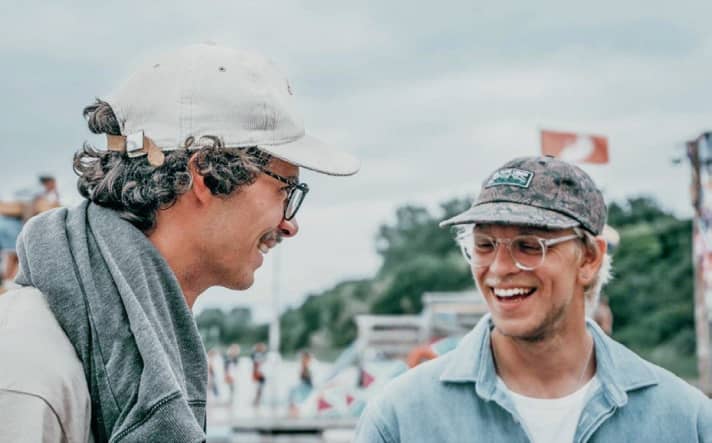
The freestyle battle during the surf festival has become a ritual over the years. The scene meets every year at the beach camp at the festival anyway, so why not organise a small contest if the wind plays along? And that brings us to the most important point - the wind. The GFB at the surf festival is currently the only contest organised by German freestylers that is not on standby. Waiting for wind is unheard of, because the contest only starts when perfect conditions are forecast. According to the forecast, the wind on Fehmarn should only provide reasonable conditions from the third day of the festival. It's an easterly wind, the sunny island lives up to its name, but at the moment it's only blowing a mere ten knots.
"Just enjoy the sun and have a cool drink," said the organisers at the skippers' meeting. "We'll hear from you again when the wind picks up at the weekend, stay clean and check the WhatsApp group from time to time. We'll keep you up to date there, Saturday looks pretty good."
A dedicated judging app for the German Freestyle Battles
"The judging app only came about at the end of 2019," Valentin continues, "I wanted to simplify the overall process of organising the contest, as we only ever had one or two (windy) days at the weekend. Organising an entire out-and-back round with over thirty participants was always pretty tight in terms of time.
And so, with the support of IT colleagues and long-standing sponsors, he managed to develop his own app for scoring. Suddenly, the manoeuvres were no longer scribbled down on fluttering paper and then the points were added up in his head; instead, a professional app took over the job: select the manoeuvre viewed, then rate it from one to five in terms of execution and press enter - the app does the rest. This made judging much easier and also looked fun: The horde of rambunctious freestylers suddenly had a bunch of state-of-the-art tablet computers in their hands, in the middle of their piecemeal minimal set-up. However, this was accompanied by an initial entry fee of ten euros per participant, as Valentin was unable to fully cover the development costs with sponsorship money and paid the rest out of his own pocket for the time being. The app has proved its worth and has been in constant use ever since - problems or major discussions during judging are a thing of the past.
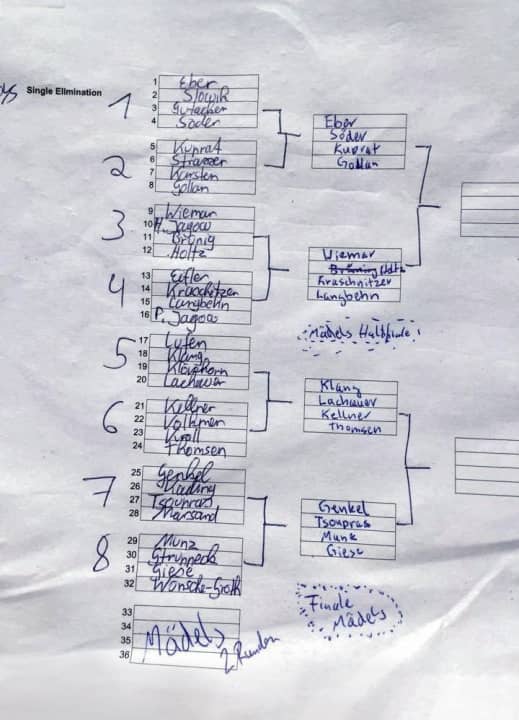
Group chat GFB:
- Fehmarn, Friday, 17:37:Skippers meeting tomorrow morning at eight ; -).
- Saturday, 7:29 am:We push to nine...
- 8:42 am:We have just decided to set the skippers meeting to ten o'clock :-D
- 11:08 am: We postpone again. The wind doesn't want to yet. We meet at the beach at twelve.
- 13:48: The wind suddenly looks good. We're about to start with heat number one. See you soon : -)
Finally, we're ready to go! But where is Lasse? "He wanted to go to Rewe!" the crowd shouts. Oh boy! "Okay, we'll give him a few minutes, but we have to start by half past midnight at the latest," says head judge Seppi.
The surf festival offers the chance to show freestyle in front of a large audience
The festival organisation has announced an official super session at six o'clock today - right in front of the stage, with a presenter and all the trimmings. You can't really pull out all the stops. The freestylers won't miss the chance to present their sport to a large audience at the festival. "We have to be on time!" Shorty adds.
Organising a competition that is one hundred percent dependent on external, uninfluenceable circumstances (i.e. the wind) is more difficult than you might imagine. A high degree of flexibility and composure is required. Shorty and Loris are not well-structured organisational talents like Valentin, but they are nevertheless made for the job: everything always works out in the end and everyone is very grateful to them for their efforts.
Good conditions are guaranteed thanks to stand-by
Young and old, levels from Airjibe to Double Air Culo, men and women: Everyone can take part in the freestyle battles! It's great to see how many freestylers have made it to Fehmarn. Lots of new faces and just as many old friends. A colourful, wild group that all have one thing in common: a great passion for tricks with boards and sails. There is no barrier, anyone who enjoys freestyling and has mastered at least one trick can take part. A tenner entry fee - that's it.
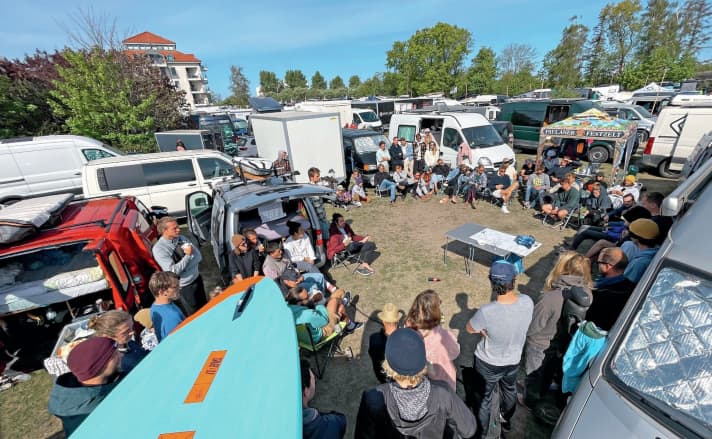
The freestylers keep it simple, and that's exactly what attracts so many people. On the one hand, this simplicity, the low costs and, of course, the relaxed and fun atmosphere. Furthermore, the guarantee of good conditions plays an important role at the standby events. Nobody likes paying entry fees, travelling costs and so on - and then waiting four days for wind during an event. The next two days, at the only non-standby event of the year, there is a lot of fiddling around, albeit at the lowest wind limit, in conditions that are not quite as perfect as usual. This suits some people, but not others. There is grumbling... cheering... pumping, fighting for points and celebrating together in the evening.
The future: German Freestyle Battle as part of a worldwide tour?
A festival, a chaos of emotions. Freestyle windsurfing is really celebrated here, on so many different levels that one or two people can get a little overwhelmed. Especially from a completely new development: the German Freestyle Battles on Fehmarn co-operated for the first time with the Freestyle Pro Tour, which has set itself the task of establishing a better structure within the discipline of freestyle worldwide. They call the contests the Proving Ground Series, in which they join forces with local events, such as the German Freestyle Battles, in an attempt to build a pyramid-like star system up to the Championship Tour. This merger put a little pressure on the shoulders of the German freestylers. For example, to force a result - even if the wind conditions are not ideal? Some riders are convinced that this once again contradicts the original idea. Others, on the other hand, believe that this kind of mutual support also helps the discipline as a whole to flourish and that people can spur each other on.
There will never be complete agreement, the last few days have seen some heated discussions. But nobody really cares that the festival is long over by Sunday evening and the tents are already being dismantled in the background as we head out for the finale. The freestylers just do their thing: I'm sure that nothing will ever change. If the wind is at its best on Sunday at eight o'clock in the evening, why should you make your way home before then? After the final, I don't run to a big award ceremony with sponsor logos - or in front of five different cameras. Instead, as the last rays of sunshine of the day creep into the horizon, I stroll contentedly along the deserted beach to my car. The last four days were still a mad rush here at this time of day - now I can easily get through with board and sail - and something flashes through my mind: Hey, we don't need all this, we'll just do our own contest.
